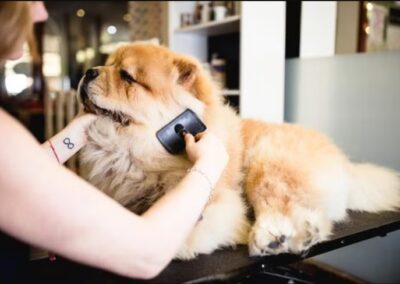
Bringing home a new puppy feels like magic. There’s that intoxicating smell of puppy fur, those tiny paws dancing across your floors, and those bright eyes that look at you like you’re their whole world.
But behind all the cuddles and chaos lies a truth that every dog owner learns fast: the way you raise your puppy in that first year sets the stage for everything that follows.
That’s right — every ounce of patience, structure, nutrition, and love you invest now will shape the adult dog you’ll live with for the next decade or more.
Get it right, and you’ll have a loyal, confident, well-mannered companion. Get lazy, and, well… you might be living with a furry little tornado.
So, let’s break it down — the real-world steps every new puppy parent should take to build the kind of foundation that leads to a long, healthy, joyful life together.
The first thing you should do — before you even unpack the toys or post your first adorable photo — is schedule a wellness exam. Puppies are fragile.
They’re curious little sponges with immune systems that are still under construction. Whether your new friend came from a breeder, a shelter, or a rescue, there’s no guarantee of perfect health.
Parasites, infections, and nutritional deficiencies can hide behind those puppy-dog eyes.
A first vet visit isn’t just a box to tick — it’s your puppy’s lifeline. Your veterinarian will check for everything from worms to congenital issues, run necessary screenings, and set up a vaccination schedule.
And if something feels off — maybe your pup’s appetite dips, they limp, sneeze, or seem tired — don’t wait it out. Puppies can go downhill quickly.
A good vet becomes your greatest ally from day one.

Once health is handled, it’s time to move on to training. Not next week. Not “once they’re settled in.” I mean right now. Every single thing your puppy experiences in these first few months is shaping how they’ll think and behave later on.
Start with the basics: house-training, crate training, and boundaries. Dogs don’t come preloaded with your definition of “good.”
They learn it through repetition, tone, and consistency. Reward positive behaviors, ignore minor mistakes, and use calm correction instead of anger.
And here’s the secret sauce: get everyone in your home on the same page. If Mom says “off” and the kids say “down,” your dog’s going to be confused.
Consistency is everything. Puppies don’t thrive on chaos — they thrive on patterns.
Now, let’s talk about something often overlooked: socialization.
A well-socialized puppy becomes a confident, friendly dog who can handle the world. It starts small — gently touching their paws, tail, and ears, introducing them to different sounds, smells, and textures.
Once your vet gives the all-clear after vaccines, expand their world: other dogs, new people, walks through busy streets, trips to pet-friendly cafes.
The more they experience early on, the less they’ll fear later. The world becomes a place of curiosity, not anxiety. Socialization is your dog’s emotional education — and it pays lifelong dividends.
Of course, a thriving puppy isn’t built on love alone. Nutrition is the backbone of growth.
Don’t just grab whatever bag of food looks good or happens to be on sale. Puppies have specific needs for protein, calcium, and fat depending on their breed and size.
Talk to your vet about what’s best — whether that’s a high-quality kibble, fresh food, or a hybrid diet. Feed measured portions and resist those pleading eyes that beg for one more bite.
Too much food now leads to joint problems and obesity later.
A well-fed puppy isn’t just full — they’re fueled to grow strong, smart, and energetic.

But here’s the part that too many owners skip: exercise and play.
Yes, puppies need naps. Lots of them. But they also need short bursts of activity that engage both their bodies and brains.
Fetch, tug-of-war, simple puzzle toys, and walks (once vaccinated) all help channel that energy into learning. When a puppy gets bored, they chew.
When they’re tired and fulfilled, they nap peacefully at your feet.
So, keep their minds busy. Make playtime part of their daily wellness plan.
Finally, remember this: raising a puppy is not a sprint. It’s a marathon with muddy paws and a few shredded slippers along the way. You’ll have frustrating days.
You’ll wonder if you’re doing it right. But then, one day, your dog will follow a command, look up at you with complete trust, and you’ll realize you’ve built something incredible — a bond that can’t be broken.
Because raising them right isn’t about perfection. It’s about presence. It’s showing up every day with patience, structure, and love.
When you do that, you don’t just raise a “good dog.” You raise a loyal friend, a family member, a soul who will walk beside you through life’s best and hardest moments.
And that — more than anything — is the real reward of getting it right.



